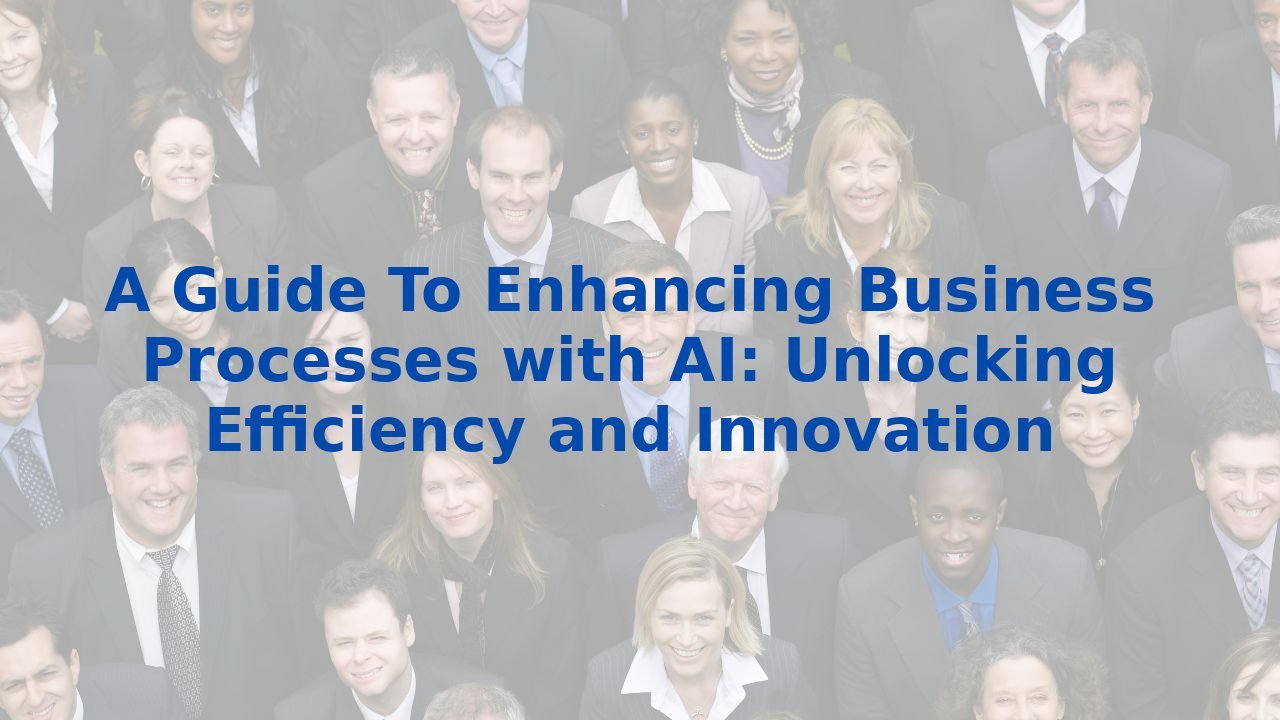A Guide to Enhancing Business Processes with AI: Unlocking Efficiency and Innovation
A Guide to Enhancing Business Processes with AI: Unlocking Efficiency and Innovation
In the current landscape where time and efficiency are gold, businesses are under constant pressure to optimize operations while maintaining quality. It’s here that Artificial Intelligence (AI) steps in—not merely as a tool but as a transformative force reshaping the very fabric of organizational processes. By adopting AI, companies can not only streamline their workflows but also foster a culture of innovation that propels them into the future.
The Evolution of Business Process Management
Business Process Management (BPM) has long been a foundational element in the quest for operational excellence. Traditionally, BPM focuses on analyzing and refining workflows. However, when infused with AI, BPM transcends its conventional boundaries. This evolution not only optimizes existing processes but also prepares organizations for rapid adaptability amidst ever-changing market conditions.
How AI Enhances Business Processes
Imagine a business environment where every operation is guided by data-driven insights. AI enhances business processes through various crucial functions:
- Process Discovery: AI employs techniques like process mining and natural language processing to capture existing processes and identify hidden inefficiencies. What once went unnoticed can now be illuminated, setting the stage for targeted improvements.
- Process Mapping: Through advanced analytics, AI can create detailed visualizations of workflows, ensuring that documentation stays current and relevant. This clarity allows teams to recognize improvement areas swiftly.
- Process Automation: Repetitive tasks can be quickly handled by AI-powered bots. This not only accelerates operations but also minimizes human error—freeing employees to tackle more complex challenges that require human intuition.
- Real-Time Monitoring: With AI, companies can achieve real-time oversight of their processes, empowering them to act promptly when opportunities or issues arise. This agility supports an environment of proactive rather than reactive strategies.
- Decision Support: AI can process both structured and unstructured data from multiple sources, revealing trends and predicting outcomes. With this capability, decision-making becomes more informed and strategic.
The Benefits of AI in Business Processes
Integrating AI into business processes yields a myriad of benefits:
- Efficiency Gains: The automation of mundane yet vital tasks liberates time that can be redirected toward strategic initiatives, thereby enhancing overall productivity and efficiency.
- Data-Driven Decisions: By analyzing extensive datasets expeditiously, AI provides actionable insights that lead to informed tactical and strategic decisions, significantly elevating organizational performance.
- Risk Mitigation: AI’s predictive capabilities empower businesses to foresee potential challenges, allowing for proactive measures to avert crises—a fundamental aspect of effective risk management.
The Role of Employee Training in AI Adoption
While the prospects of AI are enticing, its true transformative power can only be realized when employees are equipped with the right training. Comprehensive AI training cultivates a workforce ready to harness AI’s full potential:
- Understanding AI Capabilities: A foundational knowledge of AI's workings empowers employees to integrate these technologies effectively into their daily routines. This training encompasses essential aspects like machine learning and natural language processing.
- Adapting to New Tools: Change is the only constant, and as AI automates tasks, employees must learn to navigate new tools seamlessly to maximize AI’s benefits, ensuring a smooth transition from manual processes.
- Developing Decision-Making Skills: AI’s analytical prowess offers a wealth of data insights, but skills to interpret this information are critical. Training should focus on pattern recognition and informed decision-making.
Conclusion
The marriage of AI and business processes signifies a monumental shift in the operational landscape. By utilizing AI for process discovery, mapping, automation, and real-time monitoring, organizations can significantly enhance their efficiency and decision-making capabilities. However, this journey to transformation is not complete without investment in employee training. As teams become adept in working with AI, they unlock unprecedented levels of creativity and productivity. In essence, the combination of AI’s capabilities with a skilled workforce positions organizations for sustained success in a volatile business environment.
To equip your entire workforce with AI skills and ensure your organization is future-ready, consider exploring comprehensive training programs that illuminate the path forward.



